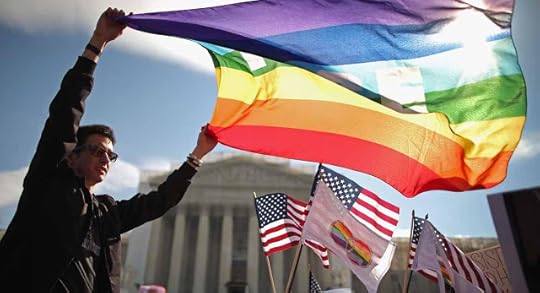Immutable Fictions: on Protected Classes by Karla FC Holloway
 Immutable Fictions: on Protected Classesby Karla FC Holloway | @ProfHolloway | special to NewBlackMan (in Exile)
Immutable Fictions: on Protected Classesby Karla FC Holloway | @ProfHolloway | special to NewBlackMan (in Exile)The phrase you are looking for, Americans-fascinated-by-the-Dolezal-fabrications, comes from Constitutional Law. It is “protected class.” That’s the legal issue that makes race matter in the “complicated” ways Dolezal insisted were a part of her identity determinations.
Yes. Of course race is an imagined social construction. In fact, race is a “legal fiction,” one that has evolved as a critical accompaniment to our country’s history. The United States has made race matter in ways that make policing its boundaries—who’s in, who’s out—an unpleasant, and sometimes odd necessity. The Supreme Court, the NAACP, scholars of black history and culture, everybody on #BlackTwitter become the hall monitors and bring a variety of membership requirements (or not) to this inevitably contradictory site. It’s historical and it’s not. It’s skin color and it’s not. It’s your mama and it’s not.
But when the proverbial “Miss Ann” slips into racial disguise, the shifting parameters make plain where the problem lies. The essential complication is a legal one. It’s the scaffolding we’ve had to construct alongside our social peculiarities—from slavery, to freedom, to #Ferguson (hashtag intentionally appended). It is through law that protected classes are maintained and established. Dolezal discovered this when she tried to sue HBCU capstone Howard University for discrimination and her suit was dismissed because she was without standing. She was not (then) a part of a constitutionally protected class. Is she today now that she “identifies as Black?” Nope.
Not if the restoration of voting rights legislation, access to federal remedies for discriminatory conduct, or legal review of a host of blatant and shadowed racisms matter. And they do in ways directly tied to our very mortality. #BlackLivesMatter is not just a hashtag. But this critical vulnerability doesn’t matter to Dolezal, who uses her privileged shape-shifting because she feels our pain and is drawn to the spirit of “black is beautiful.” But her willful ignorance of the precarity of race matters in U.S. law, especially given her professional affiliations, is offensive. She seems unconcerned that her race-based stunt will weaken the claims of others when race is just a matter of wanna-be.
I am concerned enough with race as a sustainable legal site to be one of the somebodies who turns her round. Not today Miss Ann. Back away from the house party.
Identities matter in America because we have made them matter. Despite our national imagination regarding race neutrality and the desideratum of post racial bliss, persistent structural discriminations have been necessarily and appropriately addressed through laws that make discriminatory conduct illegal. Federal laws that prohibit discrimination recognize some bodies with identities that are “immutable” in the language of constitutional law.
When Dolezal makes her race mutable, she makes a claim that does harm to the legal protections built on its arguably incoherent but nonetheless legal integrity.
Of course race can be culturally appropriated. There is something extraordinarily possible, flexible, and always in potentia in America that has constructed its special appeal. However, the “you can be anything you want—if you work hard enough…” exists outside of a critical interrogation that notices how harmful racialized conduct makes aspiration contingent.
When Justice O’Connor mused that in twenty-five years we may not need the structures of affirmative action to fix and assure educational equity, she imagined a future when the law would not be sutured to our social fictions. It was a musing some have taken to be a directive and aggressive moves to dismantle affirmative action proceed apace. It was also a musing that limned the edges of racial reasoning that have composed our legal fictions.
As a nation, we are nowhere near a race-neutral society—the resegregation of our schools, the vitality of race inequities in medical outcomes that are attached to medicine’s biases rather than intrinsic patient profiles, employment discrimination, patterns of police conduct and incarceration, the lack of diversity in technology sectors, the shootings in Charleston, these patterns shift with our cultural attainments but still, they are patterns.
Our conversations about race retain their aspirational component. We want to be whoever we think we are even though we express this wistfulness in a society that maintains patterns of discrimination. We are citizens standing in absolute need of legal protections because our conduct is a pattern of repeated racial discriminations. U.S. history and our contemporary social realities make the pairing of race and law necessary. It’s a fiction that has come to need its legal scaffold. Antics like Dolezal’s race-based fantasyland threaten the necessary protections of law.
If she’s so in-sync with black folk, that consequence should matter as much as her racial imagination.
+++
Karla FC Holloway is James B. Duke Professor of English at Duke University, where she also holds appointments in the Law School, Women's Studies, and African & African American Studies. Holloway is the author of BookMarks: Reading in Black and White and Codes of Conduct: Race, Ethics, and the Color of Our Character, as well as Private Bodies, Public Texts: Race, Gender, and a Cultural Bioethics and Passed On: African American Mourning Stories: A Memorial, both published by Duke University Press. Follow her on Twitter at @ProfHolloway.
Published on June 26, 2015 19:20
No comments have been added yet.
Mark Anthony Neal's Blog
- Mark Anthony Neal's profile
- 30 followers
Mark Anthony Neal isn't a Goodreads Author
(yet),
but they
do have a blog,
so here are some recent posts imported from
their feed.



